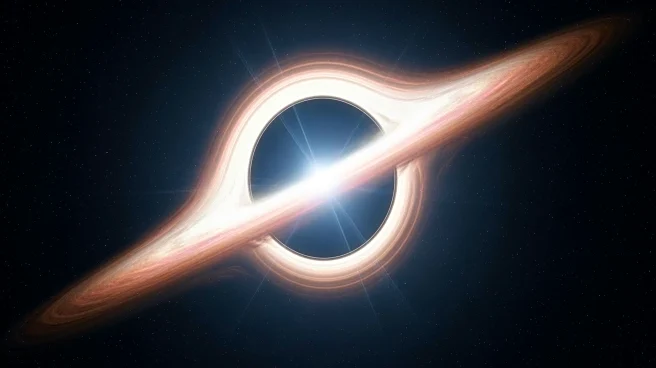What's Happening?
Scientists have observed the most energetic flare ever recorded from a supermassive black hole, shining with the light equivalent to 10 trillion suns. This event was triggered when a large star, estimated
to be between 30 and 200 times the mass of the sun, ventured too close to the black hole, resulting in its violent shredding and consumption. The black hole, located in a galaxy approximately 11 billion light years from Earth, is about 300 million times the mass of the sun. The flare was first detected in 2018 by the Palomar Observatory and reached its peak brightness over three months, becoming 30 times more luminous than any previously recorded event of its kind. The flare is still ongoing but is diminishing in luminosity, with the entire process expected to last about 11 years.
Why It's Important?
This observation provides scientists with a rare opportunity to study the universe's early epoch, offering insights into the formation and behavior of supermassive black holes. Understanding these distant cosmic phenomena is crucial for comprehending the fundamental interactions that have shaped the cosmos. The event also highlights the dynamic and violent nature of black holes, which play a significant role in influencing their surrounding stellar environments. Such discoveries can enhance our knowledge of galaxy formation and evolution, as well as the mechanisms driving these powerful cosmic events.
What's Next?
The ongoing observation of this flare will continue to provide valuable data for astronomers studying the behavior and impact of supermassive black holes. Researchers will focus on understanding the processes that lead to such energetic emissions and their implications for the surrounding galaxy. As the flare diminishes, scientists will analyze the data to gain further insights into the lifecycle of stars and black holes, potentially leading to new theories about the formation of these massive cosmic entities.
Beyond the Headlines
The event underscores the importance of advanced astronomical observatories and technologies in uncovering the mysteries of the universe. It also raises questions about the ethical considerations of space exploration and the potential impact of such discoveries on our understanding of the cosmos. As scientists delve deeper into these phenomena, the cultural and philosophical implications of our place in the universe may become more pronounced.










